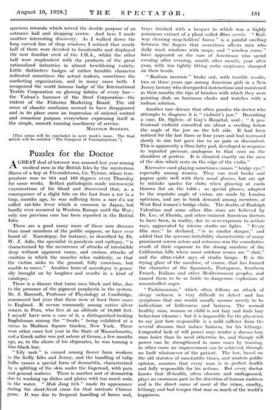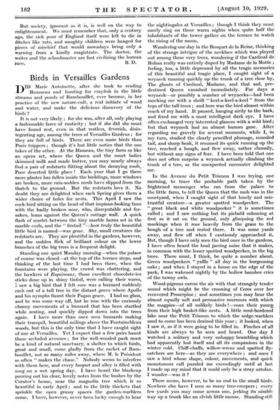Puzzles for the Doctor
A GREAT deal of interest was aroused last year among medical men in the British Isles by the mysterious illness of a boy at Fivemiletown, Co. Tyrone, whose tem- perature rose to 104 and 105 degrees every Thursday for some weeks. Belfast pathologists made microscopic examinations of his blood and discovered that, a; a consequence of a slight bite on the foot from a rat in a trap, months ago, he was suffering from a rare d:s •ase called rat-bite fever which is common in Japan, but hardly ever occurred in Western Europe until the War ; only one previous case has been reported in the British Isles.
There are a good many more of these rare diseases than most members of the public suppose, or have ever heard of. Narcolepsy, for instance, as described by Dr. W. J. Adie, the specialist in paralysis and epilepsy, "is characterized by the occurrence of attacks of irresistible sleep without apparent cause, and curious attacks of emotion in which the muscles relax suddenly, so that the victim sinks to the ground, fully conscious, but unable to move." Another form of narcolepsy is gener- ally brought on by laughter and results in a kind of catalepsy.
There is a disease that turns men black and blue, due to the presence of the pigment porphyrin in the system. Mr. J. Barcroft, Professor of Physiology at Cambridge, announced last year that there were at least three cases in England. It occurs commonly among native silver miners in Peru, who live at an altitude of 18,000 feet. 1 myself have seen a case of it, a distinguished-looking Englishman among the " freaks " being exhibited at a circus in Madison Square Garden, New York. There were other cases last year in the State of Massachusetts, and a Greek sailor was put ashore at Genoa, a few months ago, as, to the alarm of his shipmates, he was turning a blue-black hue.
"Lily rash" is caused among flower farm workers in the Scilly Isles and Jersey, and the handling of tulip bulbs causes a special form of dermatitis, characterized by a splitting of the skin under the fingernail, with pain and general malaise. There is another sort of dermatitis due to washing up dishes and plates with too much soda in the water. " Mah Jong itch" made its appearance during the short-lived craze for that intricate Chinese game. It was due to frequent handling of boxes and, trays finished with a lacquer in which was a highly poisonous extract of a plant called fans vernix. "Rail- way cleaning mop-holders' bursa" is a painful swelling between the fingers that sometimes affects men who daily wash windows with mops, and "wireless corns" have appeared on the ears of Americans who spend evening after evening, month after month, year after year, with too tightly fitting radio earphones clamped on their heads.
"Radium necrosis" broke out, with terrible results, two or three years ago among American girls in a New Jersey factory who disregarded instructions and moistened in their mouths the tips of brushes with which they were painting dials on luminous clocks and watches with a radium solution.
Another rare disease that often puzzles the doctor who attempts to diagnose it is "violinist's jaw." Describing a case, Dr. Ogilvie, of Guy's Hospital, said : "A pro- fessional violinist consulted me about a swelling below the angle of the jaw on the left side. It had been noticed for the last three or four years and had increased slowly in size but gave rise to no pain or discomfort. This is apparently a fibro-fatty pad, developed in response to repeated pressure, analogous to that seen on the shoulders of porters. It is situated exactly on the area of the skin which rests on the edge of the violin."
Excessive card playing sometimes causes "bridge eye," especially among women. They can read books - and papers quite well with their usual glasses, but are apt to mistake spades for clubs when glancing at cards thrown flat on the table ; so special glasses, adapted to the requisite angle of vision, are made by London opticians, and are in brisk demand among members of West End women's bridge clubs. The deaths of Rudolph Valentino and some other film stars are believed by Dr. Lee, of Florida, and other eminent American doctors to have been, in reality, due to over-exposure to actinic rays, aggravated by intense studio arc lights. "Every film star," he declared, " is in similar danger," and added that the nervous irritability characteristic of many prominent screen actors and actresses was the cumulative result of their exposure to the strong sunshine of the Californian hills where most outdoor scenes are "shot," and the ultra-violet rays of studio lamps. It is the trying glare of the sunshine, of course, that has formed the character of the Spaniards, Portuguese, Southern French, Italians and other Mediterranean peoples, and caused them to be so liable to dangerous explosions of uncontrolled anger.
" Parkinsonism," which often follows an attack of sleepy sickness, is very difficult to detect and has symptoms that one would usually assume merely to be indications of listlessness and laziness. The normal healthy man, woman or child is not lazy and finds lazy behaviour irksome ; but it is impossible for the physician to say just how responsible is a mild sufferer from the several diseases that induce laziness, for his lethargy.
Congenital lack of will power may render a disease-lazy man lazier than he need otherwise be, and though will power can be strengthened in some cases by training, in other cases no improvement can be achieved, through no fault whatsoever of the patient. The law, based on the old statutes of unscientific times, and modern public opinion, assumes that every man is in perfect health and fully responsible for his actions. But every doctor knows that ill-health, often obscure and undiagnosed, plays an enormous part in the direction of human motives and is the direct cause of most of the crime, cruelty, lethargy and bad temper that mar so much of the world's happiness. But society, ignorant as it is, is well on the way to enlightenment. We must remember that, only a century ago, the sick poor of England itself were left to die in ditches like rats, and naughty, children were hanged for pieces of mischief that would nowadays bring only a warning from a kindly magistrate. The doctor, the writer and the schoolmaster are fast civilizing the human

































 Previous page
Previous page